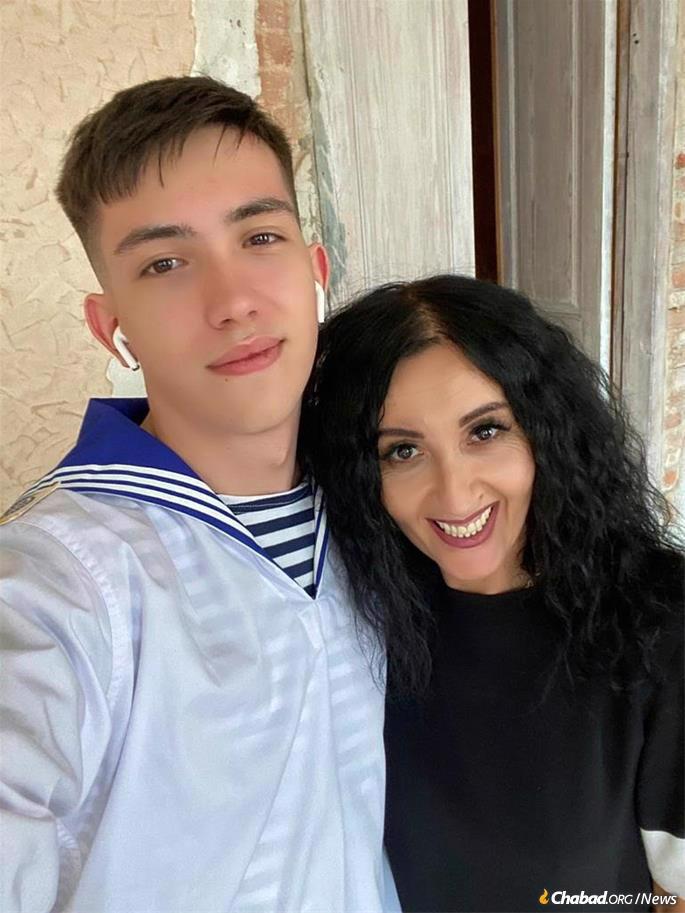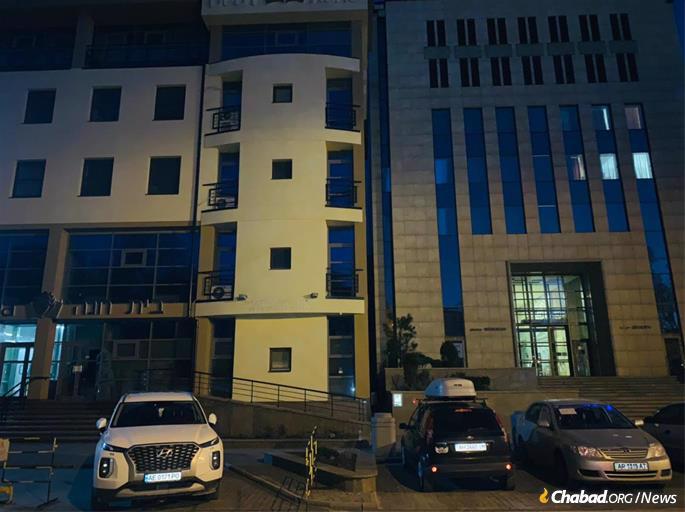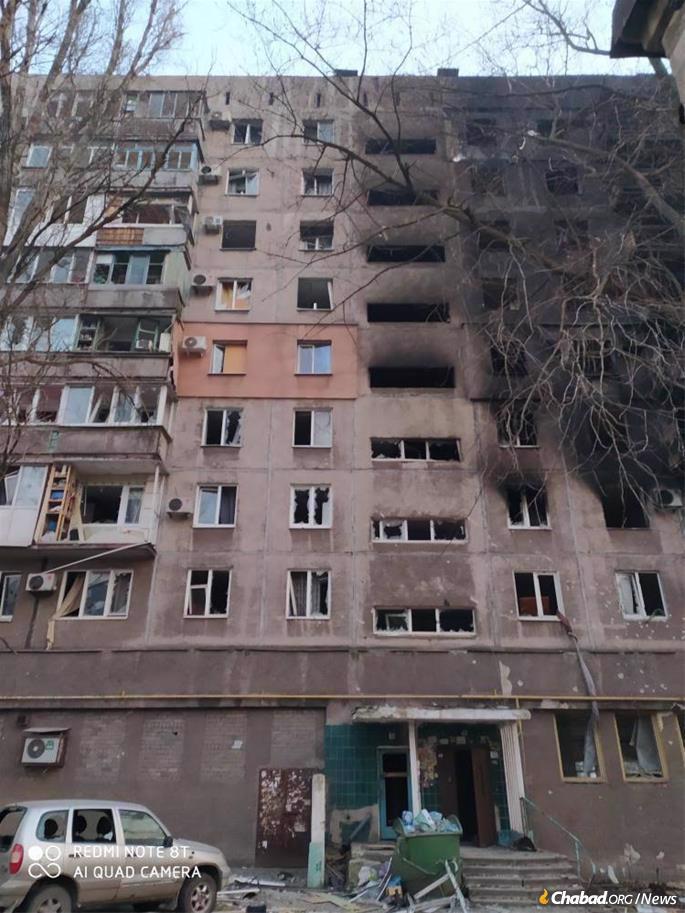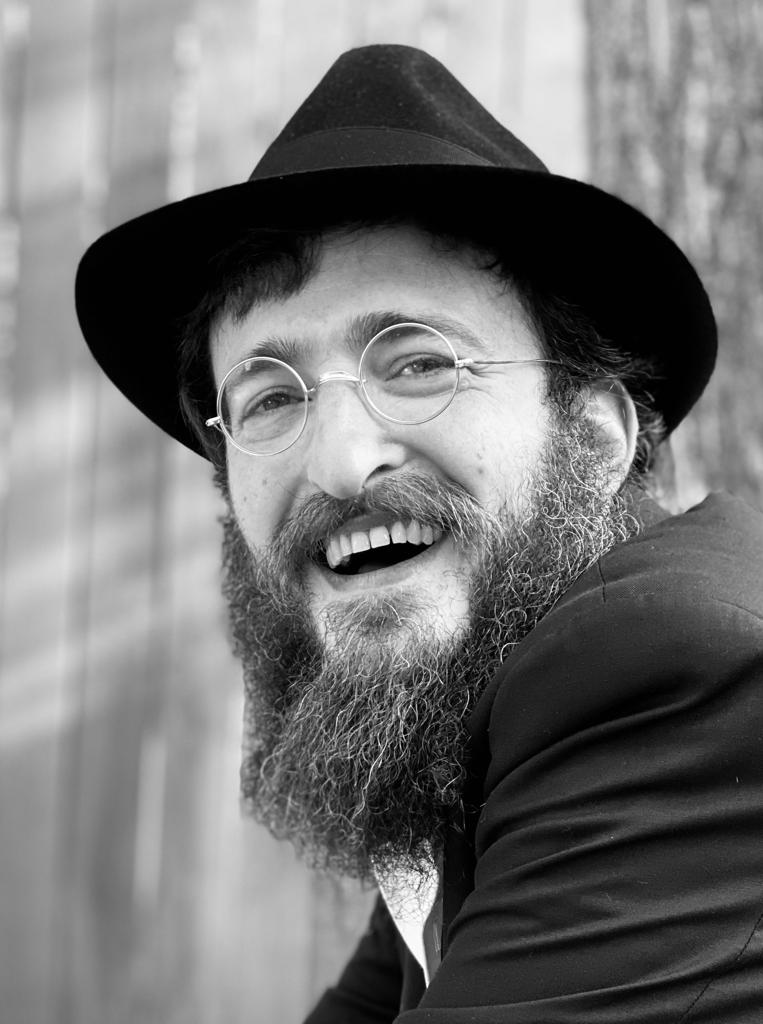SERIES: PART I
The people of Mariupol understood they were living on a powder keg. On the Ukraine side of the makeshift border with the separatist Donetsk People’s Republic, Mariupol has been a flashpoint since 2014. That’s why, when Russia invaded Ukraine six weeks ago, Mariupolites thought they were better prepared than most. They thought they knew what to expect.
Tragically, they were wrong.
“Mariupol has become a living hell,” says the city’s lone rabbi, Mendel Cohen. Cohen and his wife, Esther, established Chabad-Lubavitch of Mariupol in 2005, opening a synagogue and Jewish school, building a mikvah and social-services center, and slowly rekindling the flame of Jewish life where it had been stifled by Communism for 70 years. “Everything we built over 17 years is gone,” he says. Some 90 percent of Mariupol has been destroyed by a brutal campaign of non-stop shelling and harsh aerial bombardment that has turned the port city into a place of black smoke, twisted metal and death.
The humanitarian crisis has been compounded by the fact that Mariupol has been under siege since nearly the beginning of the war, cut off from Ukraine by land, air and sea. Food and medicine are scarce. There is no running water, gas, electricity or cell-phone service—the latter further complicating rescue efforts. On April 11, the mayor of Mariupol told the Associated Press that more than 10,000 civilians have died in the onslaught so far.
As Passover approaches and Mariupol continues to deteriorate, Cohen is doing all within his power to track down and pull people out of the besieged city and help them to safety—before it’s too late.
Lyudmila Beitar, her 18-year-old son Daniel and her 70-year-old mother, all members of Mariupol’s Jewish community, are among those who’ve escaped. After more than two weeks sheltering with 400 others in the basement of an apartment building, they managed to get their car out of a garage and make a run for it.
“I can’t even explain how we made it,” she says. “I closed my eyes and just ran. My mother, too. There were corpses on the street, a burned-out tank. Someone was bending over a body on the sidewalk and waving their hands; I don’t know what they wanted, but there was nothing I could do to help. I could only run.”
Lyudmila has worked for the Jewish Community of Mariupol since 2006, directing Chabad’s humanitarian projects in the city, and helping organize big holiday events and the like. For the first few days of the war, she even went into her office to continue overseeing the distribution of food and medicine to those flocking to the synagogue, stopping only when it became impossible to go outside.
Now she and her family are in Lviv, Western Ukraine, where she carries on her community work. Liaisoning with Rabbi Cohen, Beitar and another member of Chabad’s staff spend hours each day monitoring communication apps to see who might have appeared online, even for a brief minute, and find out where in Mariupol they are, to help them escape. She’s also in touch with community members who have made it out on their own to help them continue on their journey.
“For 16 years, I helped the rabbi prepare our big Passover Seders,” she says. “I’m usually so busy with that this time of year; there are usually so many arrangements to make. I can’t understand it. I asked the rabbi: Why won’t there be a Seder like we always have? Why will Passover be so different this year?”

Last Year’s Matzah
Mariupol was hit hard when fighting first broke out back in 2014. Eventually, though, people became used to the distant thud of rockets and war slipped into the background. But it never disappeared. “Maybe we were complacent,” Lyudmila considers. “We spent so many years on the frontlines, we weren’t as afraid as those facing it for the first time.”
The rabbi had minor surgery in early February and was in Israel with his family when the war began early Thursday morning, Feb. 24. In Mariupol, Lyudmila and the rest of Chabad staff continued working. On that first Shabbat, the community still gathered for prayers and a kiddush.
Then everything changed. On Sunday, civilian apartment buildings on the outskirts of Mariupol were shelled and public transportation stopped working. The next day the artillery fire intensified, and Grads began hitting the city center. “The wife of a community member was injured badly that day,” says Lyudmila. “People died.”
Then the electricity was knocked out. A day later, there was no running water. Beginning on March 2, there was basically no cell-phone reception, and by March 5 there was no gas or heat in the city. “We were freezing and cut off from the world,” she says.
On March 1, Lyudmila and her son left their apartment—permanently it turned out—with a change of clothes and their documents. They headed to Lyudmila’s mother’s home, located in what she thought would be a safer neighborhood. The next morning, however, rockets landed in the building’s courtyard and blew out the 11th-floor apartment’s windows. That’s when they descended into the basement of a modern, just-completed apartment building next door, where they’d all remain for the next 16 days.
There were not many people in the basement when they first got there, but as neighboring apartment blocks were hit and turned to ash, the crowd grew. By March 18, her last day in the basement, there were 400 people huddled there. Lyudmila, ever the take-charge organizer, counted 50 people in the room where she and her family lived, including seven children. There were more children spread through the basement.
During her first two days in the basement, Lyudmila made the dangerous, nearly 4-kilometer walk to the synagogue on Prospekt Mira. Stores had been emptied of any and all products almost immediately, and the need for the aid being distributed at the synagogue was immense from the start. One of the days Lyudmila made it to Chabad, supplicants had to wait 20 minutes for her outside the synagogue because she had gotten stuck huddling in an underground passageway during a rocket attack on her way over. “The rockets might start at any moment, but it wasn’t yet that intense, round-the-clock shelling that started a few days later,” she explains.
Once the attacks became more steady and more brutal, there was almost no more going out. The exception was March 7. That day started off eerily quiet, and Lyudmila saw that supplies in her own basement were running out.
“By that time, we had very little food and drinking water—basically whatever people were able to quickly grab from their nearby homes and rush over,” she says. “We collected snow and puddle water. There was no heat, but there was still water in the pipes and tanks, so we were taking that water, filtering it through towels and boiling it on an open flame.”
She drafted a man sheltering with them to drive her to the synagogue to retrieve what more they could. As they drove they passed buildings in flames. They got to Chabad and took whatever was still there, including boxes of last year’s matzahs, some of it handmade shmurah matzah.
“We were able to give it out throughout the basement,” says Lyudmila, to Jews—there were two Jewish sisters in her room who only managed to leave the basement in early April—and non-Jews. “Women, children, old people. People were hungry, and the matzah literally saved them.”

Incessant Bombing
In the basement, people slept on chairs; pried-off apartment doors, protection at least from the freezing cement floors; colorful benches taken from the courtyard; and furniture salvaged from a neighboring furniture store that had suffered a direct hit.
The time to sleep was when the Russians took a rest, usually between 9 p.m. and 2 or 3 a.m. By 4 in the morning, artillery fire was already in full-swing. “Shelling is one thing, but there’s no way to sleep through aerial bombardment,” she says. There was also always the knowledge that their basement shelter offered protection from artillery fire, but could not withstand a bombing.
When a few neighboring families fled their bombed-out building and, baby carriages in tow, stumbled on Lyudmila’s shelter, the people inside took pity on them. Even though they were way past capacity, they cleaned out a hallway that had been used as a bathroom and settled the families in there.
As Mariupol got pounded harder and harder, it became difficult to even walk out to light a fire to boil some water. “You’re outside near the fire, someone yells ‘aviation!,’ you hear the whistles of the oncoming planes and you run back in,” she says. “That could happen 15 to 20 times while just boiling water—forget about trying to cook something to eat.”
Children were not allowed to go out at all, and as it got more intense mostly only men went out. This was especially so after March 10 or 11, when a shell landed in the yard, and an 8-year-old girl and an adult male were injured. The little girl’s shrapnel wounds were fixed up by a nurse in the basement, while the man had to be rushed to a hospital.
“How far away do you think they were standing?” Lyudmila asks. “It was maybe 10 meters [32 feet], but it was far enough to get hit.”
A day or two later, a Russian tank took up a position among the apartment buildings, just 150 feet away from their basement entrance. From then on, each day they’d suffer through Russian firing, followed by the Ukrainian military’s response.

Exodus
The most difficult aspect of even contemplating escape from Mariupol was the lack of information. With no cell connection nor even a simple way to charge a cell phone for the few moments of spotty service, Lyudmila and those huddling in basements throughout Mariupol had no way of knowing what was going on in the world outside.
At times a family would decide to venture out—provided they had a car, with gas, that was still in working condition—to find out whether there was a humanitarian corridor, only to return. Indeed, an agreed-upon corridor was fired upon in the beginning of March, and the first one to hold would only be established in early April. That meant that whoever left otherwise was going at their own risk.
“Then there were people who got in their cars and left and didn’t return,” says Lyudmila. “We had no way of knowing if they made it out or if they were killed trying.”
From day one, Rabbi Cohen had been doing all within his power to save his community in Mariupol. Besides the food and medicine in his synagogue, he had families living in the basement of his own home. When things grew dire, the families in his basement used the water in the mikvah he’d built adjacent to his home for basic needs. In the beginning of March, it was still impossible to send drivers into Mariupol to evacuate people, but as the month passed, new and expensive opportunities to pull people out presented themselves and Cohen began pursuing them. The rabbi, Lyudmila says, had tried sending someone for her and her family, but they couldn’t get through to them. On March 18, family friends showed up and told Lyudmila they’d come to get her out.
Lyudmila’s friend and son, also 18, were with them in the basement, and she insisted they come along with her. Daniel and the second boy set out the third of a mile to get to the car when suddenly it began raining shells. At points, the boys were forced to crouch under cars or lay down flat and hope for the best. Finally reaching the car, they noted that of the 20 garages in the area Lyudmila’s car was parked in one of two still intact.
“G‑d wanted us to survive; that’s the only way I can explain it,” she says.
Bomb craters on the decimated streets meant they couldn’t bring the car up anywhere near the basement entrance. When the car was as close as they could get it, Lyudmila, her mother and friend made a run for it, passing corpses and flames with the singular goal of making it into the car and driving as fast as they could. After staying overnight in a quieter part of town, at 7 a.m. the next morning they headed out of Mariupol.
“Seeing the city was terrifying,” Lyudmila says. “I hadn’t seen anything in the basement obviously, and now I saw what had become of Mariupol—it was horrific. And we were in the better part of town. On the other side of town, there was literally nothing left alive.”
It took them nine hours to make it past the 15 checkpoints dotting the 110 kilometers to Berdyansk, a neighboring city under Russian control. Though they had beds in Berdyansk, the city likewise did not have electricity or hot water. The next morning, March 20, the five of them set off on the road towards Zaporizhzhia and then on to Dnipro, making it there that evening before curfew.

Praying For Freedom
Lyudmila won’t soon forget what she felt when they finally pulled up outside of Chabad of Dnipro’s 20-story Menorah Center.
“I’d been there so many times, but I was never so happy to be at Menorah in my life,” she says. She sent a photo of the building to the rabbi, who texted back “Thank G‑d!”
Dnipro’s Jewish community has been a major center of humanitarian aid for refugees hailing from throughout the country’s east, and Lyudmila and her family were put up in Menorah’s kosher hotel for three days.
“We were tired, lost, confused,” she says. “We were finally able to come into ourselves in Dnepr.”
Now in Lviv, Lyudmila is working remotely. Her main job at the moment is to locate people and send their coordinates to the rabbi, who deals with the evacuations directly. The community’s extensive address lists, unfortunately, are more or less obsolete, since people can be hiding in one of any number of basements or shelters throughout the city. Sending someone on a wild goose chase is dangerous, so Lyudmila and her co-workers slowly piece together information.
At least three members of the Jewish community have been killed in the fighting. At the same time, people thought lost—such as Tatiana Panskaya, who had managed to place a call to the rabbi and ask that he care for her daughter because she didn’t believe she’d make it—have been found in the rescue operations and are in the process of being evacuated.
As Mariupol’s prospects dim, Lyudmila works and prays.
“I pray that the bloodletting stops,” says Lyudmila. “Passover is about freedom. I pray that this Passover the whole Ukrainian people, Jews and non-Jews, will be free and return to peace.”
Click here to help the Jewish Community of Mariupol’s heroic efforts to save lives.









Join the Discussion